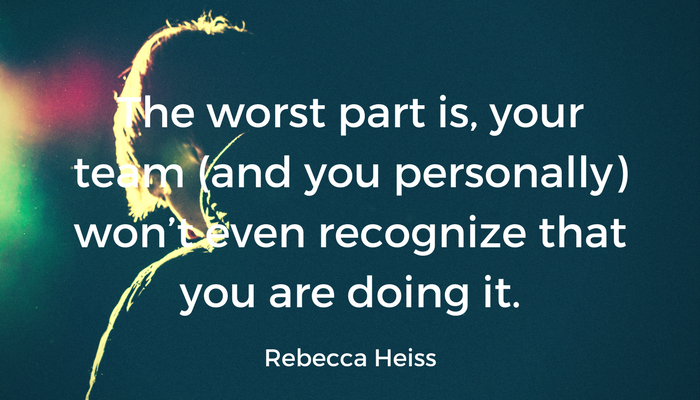This blog is a companion to an interview with Rebecca Heiss on Voice America airing on November 28, 2017, What You Don’t See Can Hurt You focusing on implicit bias! This blog was written by Rebecca Heiss.
One of the most frequent questions I get asked is, “what do biological blind spots and bias have to do with business?” In other words, “why should I care if I’m subconsciously a bit biased like everyone else?”
The short answer is that without awareness of your blind spots, you could be undermining your performance as well as the performance of your colleagues. When people first think about implicit bias, most default to a discussion around skin color, but your biological blind spots go far beyond black and white (and all of the other skin variations we leave out of the discussion).
Your brain has a pre-programmed bias for race, gender, age, class, thinking style… you name it! Whatever the bias, your brain has categorized it and made associations that “fit,” based upon an archaic formula that still primes you to crave fats and sugars despite the insane abundance in the modern environment.
Our stone-aged brain and the biases it subconsciously creates which drive our behaviors is, to put it mildly, out of touch.
The result is that your team suffers from these micro-level inter-company level competitions ultimately hurting your ability to compete where you want to – on the bigger market. The worst part is, your team (and you personally) won’t even recognize that you are doing it.
Aside from team efficacy, productivity and collaborative efforts, one of the biggest risks to business is homogeneity. While the ability to create a homogeneous product may be beneficial, a lack of diversity on the team doing the creating can be hugely detrimental to the health and sustainability of a business.
I like to make an analogy to the stability of an environment based on biodiversity. If you as a company are established like Ireland in 1845 and only have a single crop, you’ve made yourself extraordinarily vulnerable to any blind spot, or disease, wiping you off the face of the map. To avoid mass starvation in your company, plant some other crops. New perspectives.
Obviously, diversity can produce an influx of new ideas and approaches to problems, but more interesting to me is that the mere presence of a diverse work team creates an air of discomfort. Our brains were programmed to be happy with our ingroups – people who looked, acted, behaved and were essentially carbon copies of us. When you put people together who don’t fit that mold, our brains get….well….nervous.
Uncomfortable.
Low level discomfort like this actually promotes better problem solving as tensions are discussed openly. A recent study demonstrates that homogeneous groups, are more confident in their decisions, even though they are more often wrong in their conclusions, while a diverse group’s members will feel less confident despite being more accurate in their conclusions.
Confirmation bias and squelching of new ideas in homogeneous groups produces a false “feel-good we are all in this together” perspective that can render disastrous outcomes.
FEELING GOOD IN BUSINESS IS OVERRATED.
Just like working out the muscles in our body, having those uncomfortable discussions that hurt our brains a bit is the only way we grow and the only we can can start to uncover our own BS.
About the Author
Dr. Rebecca Heiss is an expert in human behavior and physiology and the founder/ CEO of a measurable stress reduction company, Instinctive Cognition. Working in the speaking and consulting industry Rebecca has developed a passion for helping others overcome blind spots to become their best biological selves. After earning a PhD with research designated as “transformative” by the National Science Foundation, Rebecca went on to hold multiple appointments in academia, applying her research to solve practical problems in overcoming what she refers to as “biological ghosts”—subconscious behaviors that haunt modern life. Described as a creative thought leader, she was honored to deliver a TEDx on a portion of her work and has built her career on helping others break through their evolutionary ethical “blind spots.” Having conquered the business of biology, Dr. Heiss has turned her focus to revolutionizing the biology of business.






